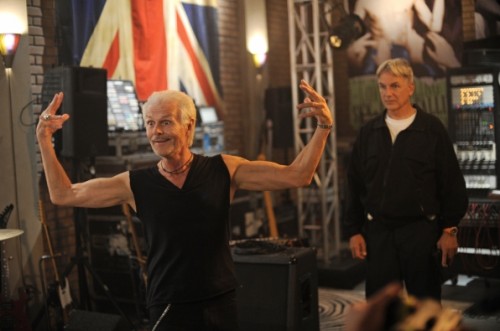NCIS, Season 10, Episode 3: “Phoenix”
Written by Steven D. Binder
Directed by Terrence O’Hara
Airs Tuesdays at 8pm (ET) on CBS
For a show that largely prides itself on its character-driven storylines, NCIS has recently produced fewer episodes whose strength results from the focused analysis of a central character, missing the mark of perfection by omitting natural human interaction, floundering with uncharacteristic writing, and needlessly revisiting disposable characters. Fortunately, with “Phoenix”, the show returns to its roots and delivers a highly-entertaining episode brimming with favorable antics and enjoyable guest appearances.
Leading the investigation-of-the-week is Doctor Mallard, who starts off the hour ominously ordering the exhumation of a corpse from a 12-year-old cold case. Unlike in “Recovery”, where his inability to occupy himself while on medical leave made for his unwelcome presence both in autopsy and on screen in general, David McCallum’s insightful doctor is genuinely enjoyable here, fumbling for orders as he assumes the role of team leader. With Gibbs standing by, ready to step in when necessary, Ducky takes charge (Rule #38: Your case, your lead), though Tony doubts his capabilities as a modern crime-solver and Jimmy Palmer’s enlarged ego and sense of responsibility leave him almost resentful of his former mentor’s unexpected return. It’s not unusual to see Palmer out of sorts, but never have his problems sent him to Gibbs’ basement, a place known for its safe atmosphere where characters have often unloaded all of their baggage on Gibb (and the viewers). Palmer’s trip to the make-shift boat shed leads to a brief but nonetheless awkward moment where Ducky’s presence makes for another great example of Palmer’s astounding ability to insert his foot into, but continue use of, his habitually troublesome mouth.
Though his temporary status as Navy investigator doesn’t quite reflect McCallum’s role as Illya Kuryakin in The Man from U.N.C.L.E. (a show once referenced by Gibbs in meta humor), Ducky is given a chance to grow as a character despite his display of rusty social skills and lack of direction in following up on the specifics of the case. His ability to relate to an aged has-been rockstar (a delightful role played by Michael Des Barres), his inability to distance himself from the grieving family, and his fear of inadequacy at his profession comprise the bulk of the character moments. However, Ducky is not the only person given a healthy portion of screen-time.
The traditional bull pen scene following the opening credits returns to the show’s regular structure and attitude with a few light-hearted moments between Tony, Ziva, and McGee. Before venturing to the crime scene, the trio discuss the concept of recording and viewing a person’s entire life through a video timeline when McGee is offered the chance to test a device that would make such an impractical service possible. With the events of the past few months in mind, the team agrees that some experiences are better left untouched, in the realm of memory. But how long will that questionable mindset be able to shield them from further emotional instability? Surely this isn’t the last of their post-traumatic issues. As much as they acknowledge recent events, it would seem as if everyone is attempting to begin moving on with their lives.
Even Abby is back to her cheerful goth self, music and all, as she discovers a link between a recently-deceased Navy Sergeant and Ducky’s cold case victim. The murder mystery pleasantly entertains with twists and turns and a “visit” to NASA. The show does ignore Abby’s connections to the association- a satellite programmer and researcher appeared a few seasons ago as friends of hers- but that oversight pays off with the introduction of Dr. Felix Blackwell (René Auberjonois), a quirky scientist whose jokes are better suited for McGee, who fares better at the shooting range than in the laboratory nowadays- again, character growth!
Once again, Steven Binder proves himself an invaluable member of the NCIS writing staff. His credits include well-regarded episodes ranging from last season (“Up in Smoke”, “Devil’s Triangle”) all the way back to the second season (“Bloodbath”, “Family Secret”). One of his most memorable scripts, however, is the fourth season episode, “Twisted Sister”, which is considered a prime example of the show’s character-driven formula. Binder’s latest attempt to bring the characters to life in classic NCIS fashion is a success. His style is appreciated, as well as his apparent enjoyment of giving viewers a sense of familiarity with the characters as well as adding new layers of growth. His ability to balance action with humor and poignancy make “Phoenix” a solid addition to his achievements as a writer who brings honesty and excitement to a series in need of revitalization.
Amanda Williams




